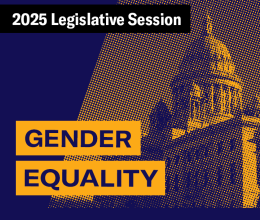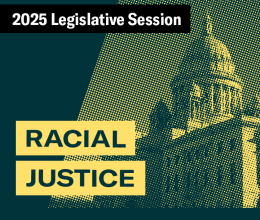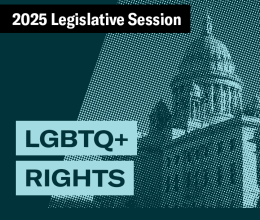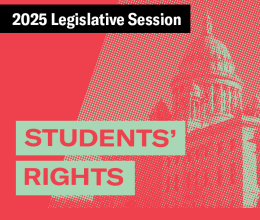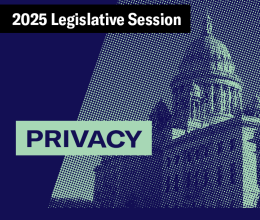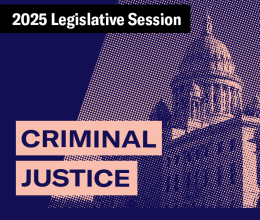For a few years, members of the LGBTQ community and other allies have been pressing the General Assembly for passage of legislation that would ban mental health providers from engaging in “sexual orientation change efforts” (colloquially known as “conversion therapy”) with clients who are minors. While the ACLU of Rhode Island both appreciates and supports the intent behind this bill, and has been an active supporter of LGBTQ rights for decades, we have opposed the legislation, largely because of some of its potential unintended consequences. In this blog, we try to explain our position more thoroughly, especially since our opposition to the legislation does not mean we oppose other means of addressing therapists who engage in this questionable practice.
As for the practice itself, the ACLU of RI fully shares the views of the legislation’s supporters and those of the professional medical and psychological communities about the discredited and potentially harmful nature of so-called “conversion therapy.” As the American College of Physicians succinctly wrote two years ago, and which is cited in a lengthy preamble to the legislation: “Available research does not support the use of [conversion] therapy as an effective method in the treatment of LGBT persons. Evidence shows that the practice may actually cause emotional or physical harm to LGBT individuals, particularly adolescents or young persons.”
At the same time, however, we believe that this type of therapy is, and can be, prohibited more appropriately through other methods, including through the professional disciplinary process. Legislative regulation remains problematic in our view, particularly because of its potential civil liberties impact far beyond its designated intent. Here is what we have argued:
* Professional licensing entities are better suited than legislators to regulate medical practices given their expertise in the field and the lower risk that such decisions will be based on politics rather than the medical evidence. We believe discredited therapies like this can be addressed under existing licensing regulations policing the profession.
* In allowing legislatures wide latitude to ban unpopular medical treatments, there may be other ramifications for transition-related healthcare for transgender people, including youth. For example, there has been some controversy as of late – within the medical profession itself – with respect to transition-related healthcare for young transgender people, such as early intervention with hormone therapy. Such medical treatment could be just as subject to legislative intrusion and decision-making based on the principles underlying this bill.
* While federal courts have upheld these laws in California and New Jersey against constitutional challenge, those court decisions demonstrate to us the dangers of implementing this type of ban by legislation. For example, California's anti-conversion therapy law was initially upheld on the ground that conversion therapy is professional conduct, not speech, and therefore outside the protection of the First Amendment." Such a position had, and has, implications for a wide variety of other medical issues involving the doctor-patient relationship. It is particularly fraught in the context of reproductive healthcare, where the ACLU has repeatedly seen legislative efforts to force doctors to provide misleading information to patients, including minors, about the risks related to abortion.
* An ongoing court battle over a Florida law opposed by domestic violence groups and medical organizations offers another example. The law bans doctors from questioning patients about whether they own guns. A federal appeals court panel initially upheld the ban on doctor-patient gun discussions by relying in part on the California conversion therapy ruling. On reconsideration, the full appellate court struck down the law on First Amendment grounds, but in doing so, the judges said there were “serious doubts” that the California conversion therapy decision was correct, noting that “characterizing speech as conduct is a dubious constitutional enterprise.” If the full appellate court had affirmed and extended the logic of the California decision to doctor-patient gun discussions, laws banning doctors from discussing guns with patients would likely be constitutional as well.
* Some of the bill’s language, such as banning practices that purport to “reduce romantic attractions or feelings toward individuals of the same sex” is quite broad. The legislation could be interpreted to extend beyond efforts to actually change sexual orientation and instead bar therapy aimed at changing behavior, e.g., helping individuals who seek to resist acting on same-sex attractions for reasons such as a desire to maintain a marriage or to enter the seminary.
* If a “talking treatment” can be banned by a state legislature based on general medical consensus, would it have been acceptable decades ago, based on the prevailing consensus at the time, for state legislatures to have passed laws restricting practitioners’ therapy treatments that failed to treat homosexuality as a mental illness?
In short, the conversion therapy laws, even if they pass constitutional muster in the courts, raise fundamental questions well beyond the conversion therapy context about the extent to which legislatures can, or will feel entitled to, regulate a doctor’s speech with a patient and otherwise intrude on doctor-patient relationships.
In place of a legislative approach, we believe in the validity and vitality of professional licensing mechanisms as an alternative way to address any inappropriate therapist conduct in this area. They pose much less danger to First Amendment rights than do conversion therapy laws.
For all these reasons, notwithstanding our shared views about the inappropriateness of this practice and the sincere efforts of the supporters of this legislation to consider our concerns, we oppose the legislation. It should by no means be taken as a retreat from our long-standing actions in support of LGBTQ rights, most recently in promoting policies that protect transgender students in the school setting. We will continue to work proudly with the community on civil rights issues of mutual concern.


